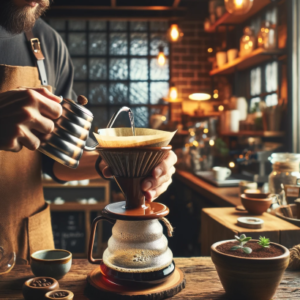More and more people are opting for specialty coffee rather than regular old coffee these days. There’s a reason that coffee shops offering high-quality, unique coffee creations are becoming ubiquitous. Specialty coffee has evolved from an occasional treat to a daily necessity for many modern coffee drinkers.
In this blog post, I’ll provide an in-depth examination of the expanding specialty coffee phenomenon. Drawing on research into industry trends and expert perspectives, I’ll outline the key drivers pushing more consumers to choose specialty coffee as their regular pick-me-up. By assessing factors like customizability, ethical sourcing, and advanced roasting and brewing techniques, you’ll gain insight into why discerning coffee lovers are eager to pay more for their daily cup of java.
People drink specialty coffee for the complex, rich flavors, health, and to support sustainable farming. The unique taste profiles and ethical production make specialty coffee an appealing choice for many consumers.
Whether you currently drink specialty coffee daily or you’re just intrigued by its popularity, this blog has essential wisdom to address your interest. Specialty coffee not only promises a superior taste, but also offers potential health benefits and promotes sustainable farming practices – all compelling reasons for its global appeal.
Let’s talk about specialty coffee. This kind of coffee is very good and has a score higher than 80 points out of 100. These scores are given for its quality, where it comes from, and how it helps the people who grow it.
People use Arabica beans to make specialty coffee because they taste great. They grow these beans high up in the mountains and take really good care of them.
Specialty coffee is different from regular coffee we see everywhere else. Experts roast these special beans in a way that brings out their yummy flavors. Also, drinking this type of coffee can be good for our health because of something called antioxidants which help protect our bodies. They can also be used to make flavored coffee to suite different tastes
People all over the world love specialty coffee more and more each day because it tastes better and is kinder to the earth. Europe drinks the most with almost half the market! And now, people can enjoy fancy coffees easily since there are more ready-to-drink options growing every year.
In places like Brazil and Colombia where they grow coffee, even local folks are starting to drink lots of specialty coffee too, enjoying new ways to have their cuppa!
Keep reading if you want to find out why everyone seems to be reaching for a mug of this special brew!
Key Takeaways
- Specialty coffee has unique flavors and high quality because it must score at least 80 out of 100 on the Specialty Coffee Association scale. This means better taste because only the best beans are picked and roasted carefully.
- People also like specialty coffee for its health benefits. It has more antioxidants than regular coffee, which is good for your body. Plus, it might have less of the bad stuff called mycotoxins.
- Drinking specialty coffee helps farmers and the planet because it often comes from farms that take care of their workers and land well. When you buy this kind of coffee, you support these good practices.
- Around the world, people enjoy specialty coffee in different ways. In some places like Norway, they love light roasts and in Brazil, people are starting to drink more specialty coffee too.
- Arabica beans are usually used in specialty coffees for their sweet flavor while robusta beans found in many regular coffees can taste bitter and earthy.
Defining Specialty Coffee

Specialty coffee stands out because it must score at least 80 points on a 100-point scale by the Specialty Coffee Association. This score tells you a lot. It says that the coffee is not just tasty but also comes from places that take good care of their workers and land.
Each bean’s story matters, from where it grows to how someone roasts it. People like knowing about the farms and methods that make their morning cup special.
This type of coffee often has unique flavors because of the careful way people grow and pick each bean. They choose only the best beans from coffee trees, paying attention to even small details to bring out great tastes and smells when they roast them later on.
That means when you sip specialty coffees, you taste what makes them different from regular ones – special hints of fruit or chocolate or flowers might surprise your mouth with each drink!
Comparing Specialty Coffee to Regular Coffee

When comparing specialty coffee to regular coffee, there are key differences in the type of beans used and the supply chain processes. Arabica beans are typically used for specialty coffee, while robusta beans are more common in regular coffee blends.
Additionally, the supply chain for specialty coffee often involves direct trade relationships with farmers, ensuring higher quality and sustainability practices.
Arabica vs. Robusta Coffee Beans
Understanding the differences between Arabica and Robusta coffee beans is crucial for appreciating the allure of specialty coffee. Arabica beans are synonymous with specialty coffee for their superior qualities. Here’s a comparison in HTML table format, elucidating the distinctions:
| Aspect | Arabica Coffee Beans | Robusta Coffee Beans |
|---|---|---|
| Taste Profile | Sweeter, with hints of chocolate, nuts, and fruits; higher acidity | Stronger, harsher, and more bitter; often described as ‘earthy’ |
| Cultivation Altitude | Grown at higher altitudes, often above 2,000 feet | Thrives at lower altitudes compared to Arabica |
| Bean Shape | Oval with a curved crease | Rounder with a straighter crease |
| Caffeine Content | Contains less caffeine, contributing to a smoother taste | Higher caffeine content, which can impart a bitter taste |
| Sugar and Lipid Content | Higher levels of sugar and lipids, enhancing flavor complexity | Lower sugar and lipid content |
| Specialty Grade Eligibility | Only Arabica beans can be labeled as ‘specialty’ based on industry standards | Typically not considered specialty-grade, mostly used for instant coffee and blends |
| Price Point | More expensive due to meticulous cultivation and processing | Less expensive, making it a common choice for mass-market products |
Arabica beans dominate the specialty coffee market for their nuanced flavors and quality. Roasters and connoisseurs prefer these beans, acknowledging the craftsmanship in their journey from farm to cup. Robusta beans, while having their own market, do not meet the ‘specialty’ threshold due to their robust, often bitter taste and lower altitudinal growth conditions. The commitment to quality reflected in Arabica beans is a testament to the specialty coffee industry’s dedication to excellence.
The Supply Chain Differences
Specialty coffee takes a unique path from farm to cup. The beans grow in the shade at high places and people pick them by hand. They even choose each one carefully. Regular coffee is different – it grows under the sun on flat land, and machines do most of the work picking and choosing the beans.
The experts who make specialty coffee care a lot about keeping it fresh and tasty. They send out whole beans that last longer without losing flavor. Then, right before you brew your drink, you grind these beans to get all that goodness into your cup! Regular coffee often comes pre-ground, which can make it lose its special taste faster.
Reasons for Drinking Specialty Coffee

People drink specialty coffee for its better taste, health benefits, and sustainability factors.
Better Taste
Specialty coffee tastes better than regular coffee. It comes from high-quality beans that have the right size, color, and density. These beans are carefully picked and brewed to create a rich flavor that is both aromatic and full-bodied.
Coffee roasters take their time to roast these beans just right. This brings out the best taste in each cup.
Fans of specialty coffee enjoy its unique flavors that can range from fruity to chocolatey. Each sip offers something special because of how it’s made—from picking the best coffee cherries to roasting them with skill.
Good brewing methods also play a big role in making sure you get a great-tasting beverage every time.

Health Benefits
Specialty coffee offers several health benefits compared to regular coffee. It contains higher levels of antioxidants, which have been linked to reducing the risk of chronic diseases and improving overall health.
The careful cultivation and assessment of specialty-grade coffee may result in a product with higher nutritional value and potential health benefits, ensuring that you get more than just a great taste when enjoying your favorite brew.
Some studies suggest that specialty coffee may also have lower levels of mycotoxins, potentially reducing the risk of negative health effects associated with mycotoxin consumption.
Sustainability Factors
Specialty coffee’s popularity is also fueled by sustainability factors.
Consumers are becoming increasingly conscious of the environmental and social impact of the products they purchase, including their coffee.
This has led to a growing demand for sustainably sourced and produced specialty coffee. The Specialty Coffee Association (SCA) plays a vital role in certifying that specialty coffee meets strict quality and sustainability standards, ensuring that producers meet these criteria to remain competitive in the industry.
The demand for sustainable coffee is not just a passing trend but a fundamental shift in consumer behavior. It’s essential for specialty coffee producers and companies to align with these sustainability factors, as it influences purchasing decisions worldwide.
With this strong emphasis on ethical sourcing and production, the industry continues to evolve toward promoting transparency and environmentally friendly practices.
The Ethical Sourcing Behind Specialty Coffee
One key factor making specialty coffee appealing to modern consumers is its emphasis on ethical production. As people grow more concerned about the social and environmental impact of their purchases, specialty coffee’s focus on sustainable practices is attractive.
Specialty coffee producers often establish direct trade relationships with growers, frequently in developing regions. This streamlines the supply chain to ensure more money goes back to farmers. Specialty buyers may also pay premiums for meeting quality and labor standards. Such practices empower growers economically while incentivizing environmentally sound cultivation.
Transparency around sourcing is also important to consumers. Technology like blockchain creates visibility into the supply chain, providing assurance about fair labor practices and sustainable farming techniques. Consumers increasingly want this transparency about where their coffee comes from and how it was produced.
Overall the specialty coffee industry is oriented around promoting agricultural and social ethics. Between sustainable farming methods, fair labor practices and transparent sourcing, there is an emphasis on quality for all producers across environmental and humanitarian metrics.
As consumer values shift toward responsible production, specialty coffee’s commitment to ethics makes it increasingly attractive. The growth of specialty coffee allows discerning drinkers to enjoy great taste while also supporting meaningful social and environmental sustainability.
The Global Popularity of Specialty Coffee

With the rise of specialty coffee consumption in different regions and cultural differences in its consumption, it’s fascinating to explore the global popularity of this gourmet drink.
Learn about the unique preferences and trends that shape the way people enjoy specialty coffee around the world by reading more.
Specialty Coffee Consumption in Different Regions
Specialty coffee has a growing audience worldwide, with consumption trends varying by region, reflecting local preferences and the evolution of coffee culture. Each area offers a unique insight into the specialty coffee market’s expansion and consumer behavior.
| Region | Market Share | Consumption Growth | Notable Facts |
|---|---|---|---|
| Europe | 46.2% | Steady increase | Largest share of global specialty coffee market. |
| North America | Significant | Robust growth | US shows a strong preference for specialty blends and single-origin coffees. |
| Asia-Pacific | Expanding | Rapid rise | Emerging markets with growing middle class and interest in coffee culture. |
| Latin America | Growing | Substantial increase | Domestic consumption is on the rise, especially in Brazil and Mexico. |
| Africa | Developing | Moderate growth | Increasing interest in local production and consumption of specialty coffees. |
Consumers’ tastes are becoming more refined, and the demand for high-quality coffee drives the specialty sector’s growth. This shift in consumption patterns highlights an appreciation for the distinctive flavors and qualities that specialty coffee offers.
Cultural Differences in Specialty Coffee Consumption
Scandinavia leads the way in embracing specialty coffee, with a strong emphasis on light roasts and single origin beans. The Nordic countries, particularly Norway, have a high per capita consumption of coffee and are known for their preference for black coffee.
In these regions, there is also a growing interest in plant-based milk alternatives such as oat milk to accompany their specialty brews.
In contrast, Colombia has been a prominent player in the production and export of specialty coffee due to its ideal climate and topography. While domestic consumption of specialty coffee is increasing in Colombia, it still lags behind countries like Norway. Exploring The Special Qualities Of Colombian Coffee
Conclusion
In conclusion, specialty coffee offers a superior taste and quality compared to commercial coffee. Emphasizing health benefits and sustainability, consumer behavior is shifting towards more conscious choices, such as plant-based milks in their coffee.
Understanding the meticulous process from seed to cup elevates appreciation for the expertise and effort behind each brew. As you savor your next cup of specialty coffee, reflect on its journey from high-altitude farms to skilled roasters before it becomes an enriching experience in your mug.
How can you support sustainable coffee practices? Consider exploring local roasteries or educating others about the value of specialty coffee. Cheers to embracing the world of specialty coffee with a deeper understanding and greater enjoyment!
FAQs
1. What is specialty coffee?
Specialty coffee is high-quality coffee that comes from a single place, like a certain farm or region. People roast and brew it carefully to make sure it tastes really good.
2. Why do people like to drink freshly roasted coffee?
Freshly roasted coffee tastes better because all the rich flavors are new and strong. It’s like eating an apple straight from the tree instead of one that’s been sitting around for weeks.
3. Can drinking specialty coffee be good for your health?
Yes, gourmet or specialty coffees often have health benefits when you drink them without too much sugar or dairy products in moderation.
4. How do baristas make espresso with speciality arabica beans?
Baristas take special Arabica beans, grind them up, and then use an espresso machine to push hot water through the grounds making a small but strong cup of coffee called an espresso.
5. Do people go to cafes just for specialty drinks like nitro or french press coffees?
People enjoy going to cafes not only for unique drinks like nitro-infused or French press brewed coffees but also because they can hang out with friends, work on their laptops, or just relax in a cool spot.
6. Is there anything bad about some non-specialty coffees I should know about?
Some regular non-specialty coffees might have pesticides used during their growth which aren’t great for you; this is less common in single-origin and other types of higher-end specialty coffees that pay attention to these details.






